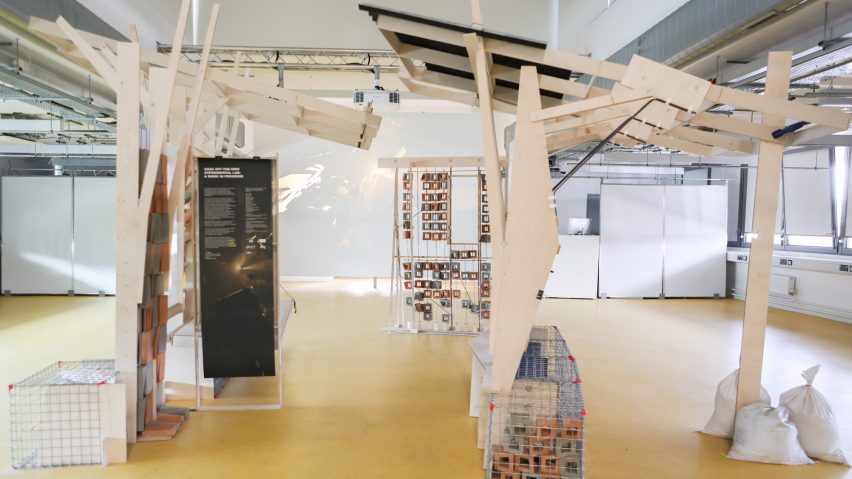Architects for Gaza has displayed sections of an experimental clinic, which it plans to build in Gaza "as soon as there is a gap" in Israeli strikes, at the London Festival of Architecture.
On show at the University of Westminster School of Architecture and Cities, the full-scale segments were designed to demonstrate how structures could be built to provide primary care in Gaza where 70 per cent of all health infrastructure has been damaged or destroyed since the most recent escalation of the Israel-Palestine conflict in October.
Named Experimental Lab/Clinic, the project by Architects for Gaza was designed by curators Yara Sharif, Nasser Golzari, Francois Girardin and Paolo Cascone to be built using the scarce materials available in Gaza. The clinics would also act as a kind of "atlas of possibilities" to demonstrate construction techniques that people can use to rebuild their homes and neighbourhoods.
The post-and-beam structure integrates DIY solutions developed by locals during previous reconstruction efforts, as the import of construction materials like cement and steel has been restricted since Israel and Egypt placed the territory under a blockade in 2007.
"We are basically building on how Gazans work with limited material to come up with innovative alternative techniques for reconstruction," said Yara Sharif, who runs advocacy group Architects for Gaza with her partner Nasser Golzari.
"They're very creative. So if anything, we're just learning from them and accumulating their innovative techniques in the form of a lab to showcase what can be done for reconstruction while working with available resources."
The Gaza Strip has seen five wars since 2007. But this most recent escalation, following an attack by Hamas militants on 7 October, has been by far the most destructive.
In the last 10 months, Israeli strikes have damaged 62 per cent of all houses in the territory, displacing 90 per cent of the territory's population and killing more than 38,000 people.
Almost all of Gaza's healthcare infrastructure, including 31 out of 36 hospitals, is either damaged or destroyed.
Due to Israel's ongoing strikes, the few facilities that remain are overwhelmed with trauma patients, leaving people with less acute conditions such as pneumonia, diabetes and asthma unable to receive the care they need.
This will lead to "many indirect deaths" in the coming months and years, according to a recent study published in medical journal The Lancet, which estimates that the death toll in Gaza could surpass 186,000 people.
Architects for Gaza believes that its temporary structures can help change this by providing temporary GP surgeries staffed with doctors from the Mobile International Surgical Teams (MiST), which has been operating in Gaza since 2010.
"Our big aim is several units aligned to the main hospitals in Gaza, with good, strong partnerships with locals," said MiST doctor and London GP Mizan Hoque. "The benefit of a primary care service is it's quite cost-effective compared to secondary care like hospitals."
"It covers 90 per cent of the healthcare problems and ailments that we'll be seeing," he added. "And it's setting the foundation, hopefully, for the medium to long-term rehabilitation of the population."
The roaming clinic was designed to be demountable, with a timber framework that is bolted together so it can be easily dismantled and moved to wherever the need is greatest.
All of the building's electricity would be provided by solar panels, which also function as louvres, while wind catchers and wet clay panels provide ventilation and evaporative cooling without the need for air conditioning.
"This is really an experimental process, where we tried to map very carefully the materials that are available in Gaza, to map what people do and try to think of what we call an atlas of possibilities," Sharif said.
Among the solutions on show are roofs made of corrugated metal, polycarbonate windows that let in light but block out heat, and structural supports made of rebar, sandbags and rubble-filled gabion baskets.
Domestic elements like a folding bed, fabric blinds and privacy screens were integrated to give patients a sense of safety and security while providing them with a blueprint they can follow for their own homes.
A number of Palestinian practices that have been trying to gain access to the blockaded territory since the start of the war to facilitate a "self-help approach" to Gaza's reconstruction.
The duo aims to build the first mobile clinic as soon as there is a ceasefire – or even before. "Whenever there's a gap, we will go," Golzari said.
London Festival of Architecture 2024 took place from 1 to 30 June 2024 at various locations across London. See Dezeen Events Guide for an up-to-date list of architecture and design events taking place around the world.
Comments have been turned off on this story due to the sensitive nature of the subject matter.

